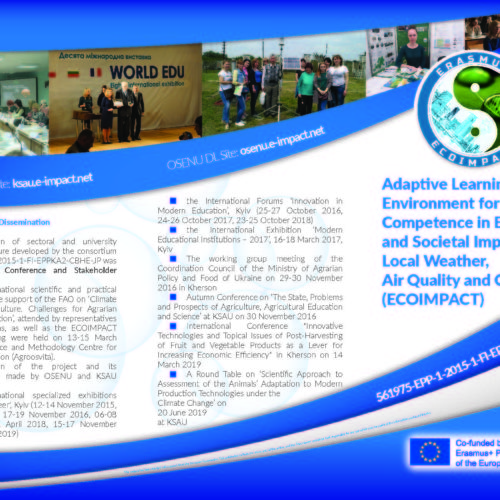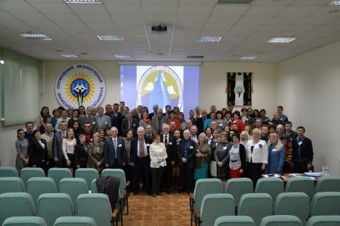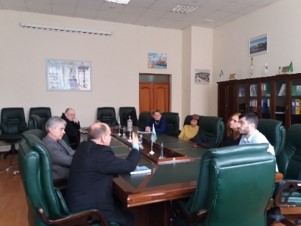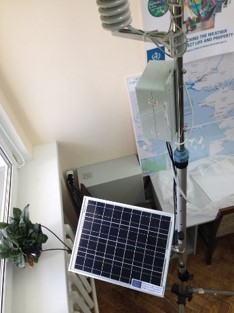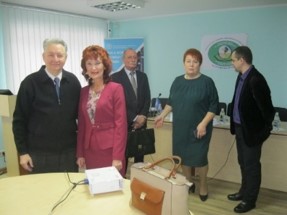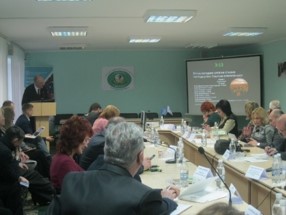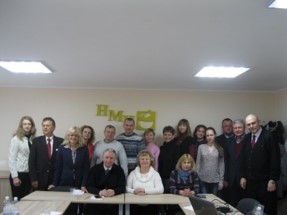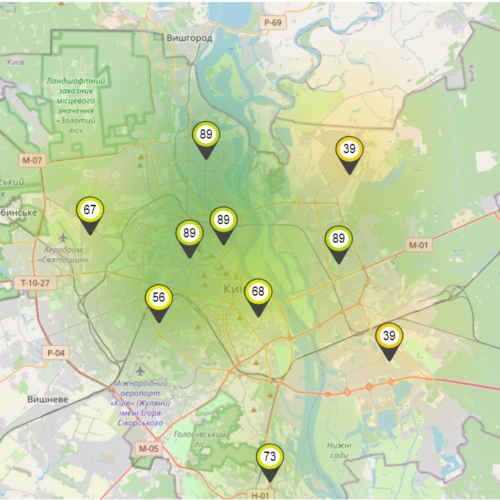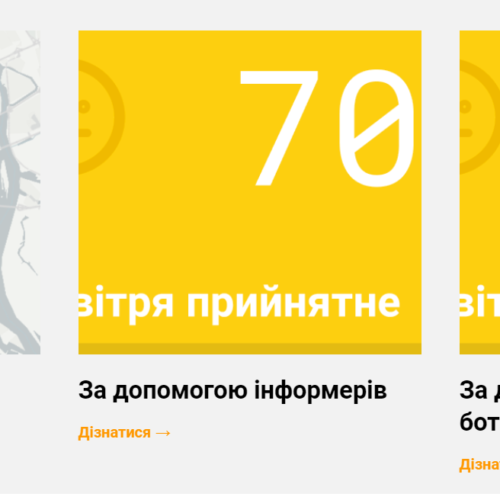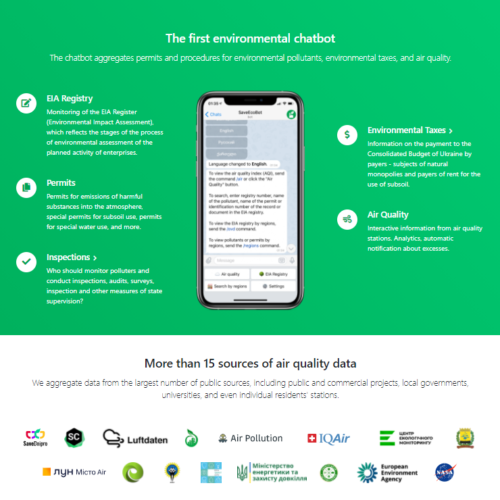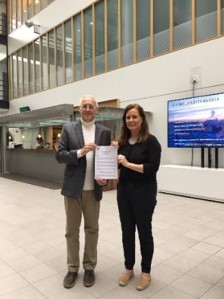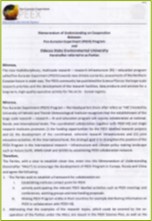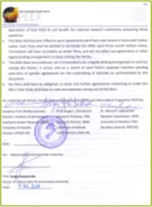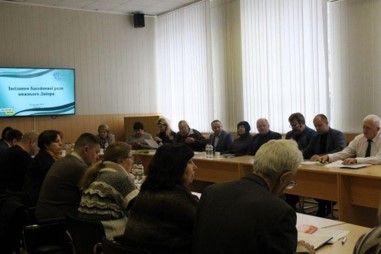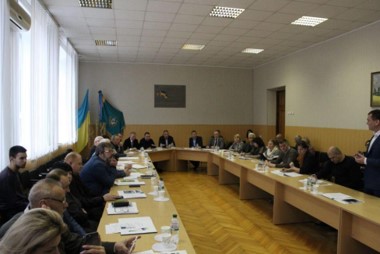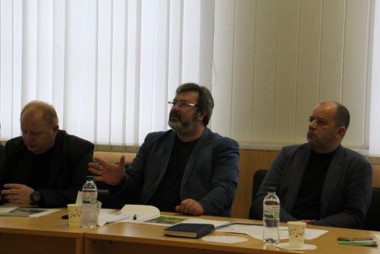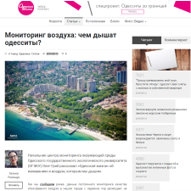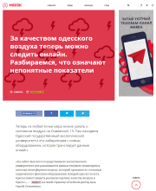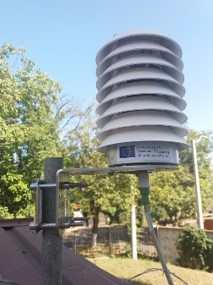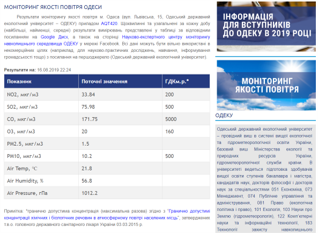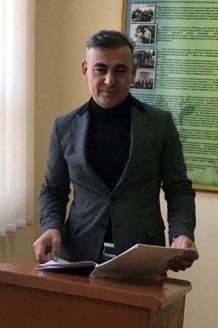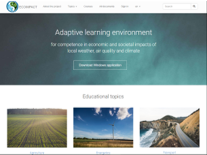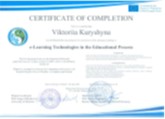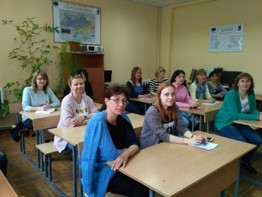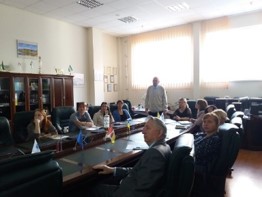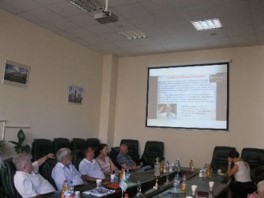Sustainability and Dissemination Strategies
The Strategy is implemented persistently by the staff of PC HEIs through academic articles, training courses, social media and virtuous circles.
The main target groups are BSc, MSc and PhD students, teaching staff (professors, associate professors, trainers) and trainees (experts).
GENERAL ASPECTS
Strategy for dissemination, sustainability and exploitation of the project results
The project results are used by the project partners at all levels. The personal learning environment https://ecoimpact-ple.com/, to which the necessary equipment is connected, is used in the educational process at UA partner HEIs. The ECOIMPACT PLE platform and other project outputs are promoted through the project website, FB group, consortium contacts with weather companies, professional channels and partners’ relations with national meteorological services, publications, participation in conferences and exhibitions, in particular, on-line participation at the International Exhibition ‘Modern Educational Institutions’ (4-6 August 2020, Kyiv).
Odessa State Environmental University. Flyers for each developed course are regularly distributed among OSENU entrants and students at various career guidance, exhibition and other events. The purchased and installed equipment is used by OSENU students, teaching and administrative staff for training sessions, laboratory work and organization of distance learning system. All OSENU academic staff who have participated in the project training sessions successfully integrate the acquired new knowledge, skills and abilities into the educational process.
Taras Shevchenko National University of Kyiv.
Developed distance course in Economic Meteorology for Master students is used for teaching students of the Meteorology and Climatology department of TSNUK.
Textbook in Economic Meteorology (authors Shevchenko O., Snizhko O., Vitrenko A.) is used for teaching this subject in Ukrainian Universities.
Handbook for practical work on Meteorology and Climatology (authors Shevchenko O., Snizhko O., Krukivska A.) is using for teaching this subject students of the Geography faculty and Institute Biology and Medicine of TSNUK.
Knowledge and skills obtained by staff of the Meteorology and Climatology department of TSNUK participating in training and workshops within the project are used for improving the programs and content teaching courses.
Modern PCs and equipment purchased for the department Meteorology and Climatology of TSNUK within the project are used for the joint research with German colleagues from Alberts-Ludwig University of Freiburg and German Weather Service based on the three-dimensional model ENVI-met and model Sky Helios. The results of joint research could be the basis for future Ukrainian-German scientific or educational projects.
Kherson State Agrarian and Economic University (before 15 October 2020 – Kherson State Agricultural University).
- The created learning environment is used jointly with the project partners http://e-impact.net/
- Joint use with representatives of production units: Center for Hydrometeorology in the Kherson region (https://www.facebook.com/meteokherson/), scientific and methodological center “Agroosvita”, FG “Ecopharm” in the village of Dubrovka, Gornostayev district, Kherson region (https://opendatabot.ua/c/41664920) and the State Enterprise Experimental Farm “Askaniyskoe” Askaniyskaya State Agricultural Research Station of the Institute of Irrigated Agriculture of the National Academy of Agrarian Sciences of Ukraine Kakhovka district of Kherson region“ (http://askaniyskoe-ua.com/)
- Created and operates the lower Dnipro basin council http://www.ksau.kherson.ua/news/4423-2019-12-17-1.html
- Cooperation with “Institute of Postgraduate Education and Counseling” http://www.ksau.kherson.ua/news/5747-2020-12-24-2.html
External stakeholders support the sustainability of project results primarily through established innovation networks and the Project Advisory Board.
The results in section ‘Agriculture’ were used in the research project «05.01.01.01 “Investigate the processes of formation of water resources in agricultural landscapes, develop methods for regulating their balance and quality in different farming systems” state registration № DR 0116U002706, that is being implemented by the Institute of Water Problems and Land Reclamation of National Academy of Agrarian Sciences of Ukraine
Results of developed of new educational course on “Economical meteorology” in the frame of ECOIMPACT project used by development of “Ukrainian National Strategy of Adaptation to Climate Change” in the Ministry of Environment and Natural Resources of Ukraine
Results of project in methodology of air quality monitoring and design of sensor’s air quality stations on the “IoT”-concept have implemented in “Kyiv Smart City”, LUN company, and national public monitoring net SaveEcoBot.
KSAEU held 4 international conferences: the 3nd International Scientific and Practical Conference ‘The impact of climate change on spatial development of Earth’s territories: implications and solutions’ (June 11-12, 2020), the 3nd International Scientific and Practical Conference ‘Ecological Problems of the Environment and Reasonable Nature Management in the Context of Sustainable Development’ (October 22-23, 2020), the 2nd All-Ukrainian Conference for Young Scientists ‘Modern Science: Status and Prospects for Development in Agriculture’ (November 10, 2020), All-Ukrainian scientific-and-practical conference ‘Climate adaptation in Ukraine: status, challenges and prospects’ (May 15, 2020)
KSAU and OSENU as co-leaders of WP7 are responsible for dissemination and exploitation of results. Upon completion of the project, support for the project website and training web resources must be provided by OSENU staff (Foreign Relations Dept.) for at least 5 years. At TSNUK, Mr. Oleksandr Bedyuh, Head of Department of Technology Transfer, is responsible for dissemination and exploitation. At KSAEU, the responsible person is Professor Alexander Averchev, Vice-Rector for Research and International Affairs, DSc (Agriculture).
At TSNUK, the dissemination and exploitation is documented by Certificate about implementation of results of project or memorandum of collaboration. In 2020, a draft Regulation on organization of the implementation of the results of international educational projects performed at Odessa State Environmental University was developed.
Activities ensuring the project sustainability after its completion.
During the project implementation DL resources appeared, purchase of modern equipment and software for teaching made it possible to introduce a personal learning environment and the concept of ‘Internet of Things’ into the educational process, and practical experience in the work with devices and mastering methods for creating video lectures provided improvement of teachers’ skills. Upon completion of the project, support for the project website http://e-impact.net/ and the Project Partner DL site at OSENU http://osenu.e-impact.net/ is provided by the staff of OSENU Foreign Relations Department.
The new syllabus of the course on ‘Economic Meteorology’ (4 ECTS credits) developed under the project was taught at OSENU in the autumn term of 2019-2020 academic year for MSc students of the 2nd year of study. The developed course on ‘Agriculture’ (17 ECTS credits) was taught in the spring semester of 2019-2020 academic year for MSc students of the 1st year of study. The developed module on ‘Climate change and the consequences for the bioclimatic regime’ of the new course on ‘Biometeorology’ (1 ECTS credit) was taught in the spring semester of 2019-2020 academic year for MSc students of the 1st year of study, within the discipline of ’Aspects of Environmental Climatology’.
The introduction in TSNUK of the innovative distance education platform «KNU-education online» ensures the sustainable use of the Project results and the expansion of the possibilities of the interactive learning process.
New teaching technologies with the use of new equipment are being actively introduced into the educational process of KSAEU, a training and research complex is being created for complex scientific research and students in various specialties and educational programmes. Updated curricula for the “Master” level under specialty 204 – “Technology of production and processing of livestock products“ is introduced. The stability of the results in the project is taken into account in the introduction of the initial course “Zoometetorology“ at KSAEU.
Project website statistics: 142 posts, 137 pages, 111181 visits (as of November 2020).
THE PROJECT IMPACT AT THE INDIVIDUAL (PROFESSIONAL) LEVEL –
students, other stakeholders
Development of an e-learning system and creation of an open local air monitoring system contributes to the attractiveness of UA partner HEIs for potential entrants and the involvement of motivated PhD students and young scientists. The plan of recruitment for state-financed places on a competitive basis for Master Degrees is maintained. Testing of the course allowed to attract foreign students from Kazakhstan and Turkey. The project contributed to a 10-17% increase in the performance rating / the success rate of the students who were involved in the project.
The project impact on improving the effectiveness of laboratory internship of students was reflected in their awareness rise by 15-20% and the level of competence – by 8%. Students are more motivated and more often choose for internships the scientific institutions and departments in regional centers of hydrometeorology, which deal with the problems of economic meteorology, biometeorology and agricultural meteorology. Automated meteorological stations IT-Lynx is used for practical classes of students. In a modern weather laboratories, the students of UA partner HEIs have the opportunity to gain thorough theoretical knowledge and practical skills of the future profession. In addition, the results of the project have been used by students to write master’s theses and the international conference papers.
Most of the TSNUK graduates over the years of the project have chosen to work in the fields of meteorology because their competitiveness in the national labor market has increased. Employers directly invite them to work most often after students have successfully completed the internship at their institutions. At OSENU, there is a Department for Facilitation of Graduates’ Employment, according to which the situation with students’ employment has improved slightly since 2019. Career center for students on the basis of SHEI “KSAU” operates sustainably.
The overall level of students employment increases due to the expansion of competencies which they get in new educational programs.
Teachers, students and stakeholders have an understanding of the involvement of project results in the learning process in terms of raising their professional awareness. The use of new distance courses and laboratory work using atmospheric monitoring data obtained with the help of modern devices has made the learning process attractive for both students and teachers.
Participation in training sessions under the project significantly contributed to the professional growth of the participants, in particular, their awareness increased by about 12%. Due to involvement in project activities, participants acquired IT skills, improved their ability to teach and conduct research, etc. Participation in trainings helped the teachers to get modern knowledge about weather, climate and air pollution and to integrate this knowledge into new training courses. Participants gained practical experience in compiling matrices of mental justification of courses and matrices of weather-dependent processes, creating training materials for PLE.
Participation in trainings under the project significantly contributed to the improvement of English language proficiency of the participants. Some of the teachers continue learning English at various language courses.
About 180 students, 30 teachers and 20 administrative workers (230 people in total) were involved in the project and obtained the professional growth.
THE PROJECT IMPACT AT THE INSTITUTIONAL LEVEL – changes in organizational behaviour
Understanding of the importance of internationalization processes by OSENU management is constantly high. The TSNUK management team is well aware of the importance of the internationalization of education, and the ECOIMPACT project has helped to strengthen this process of university development.
Results of project were discussed on the special conference of Scientific Council of the Faculty of Geography and on the Scientific-Methodological Council of TSNUK.
The planned advanced training courses in e-learning technologies and PLE introduction for teachers at OSENU, due to quarantine restrictions during March-June 2020, has been postponed to May-June 2021. There were several such events organized for the project duration period (27.11.2017 -15.12.2017, 19.03.2018 – 06.04.2018, 20-30.06.2018, 18.06-02.07.2019, in total 57 course-takers)
THE PROJECT IMPACT AT INSTITUTIONAL LEVEL – partnership building
1) Partnership agreement with “Kyiv Smart City” about collaboration in creation of municipal public air monitoring on the base of “IoT”-concept. https://air.kyivsmartcity.com/
2) Partnership agreement between TSNUK ECOIMPACT team and LUN company about scientific consulting of creation and development of local monitoring net as social project for Kyiv citizens https://misto.lun.ua/air-quality-test-test
3) Collaboration with national public monitoring net SaveEcoBot https://www.saveecobot.com/en
The air quality station Vaisala AQT420, which was received by TSNUK within the ECOIMPACT project is included in national public monitoring net SaveEcoBot (monitoring point № 26 https://www.saveecobot.com/en/maps#16/50.3845/30.4795/aqi/comp+cams+fire)
4) Results of developed of new educational course on “Economical Meteorology” in the frame of ECOIMPACT project used by development of “Ukrainian National Strategy of Adaptation to Climate Change” in the Ministry of Environment and natural resources of Ukraine.
5) Created and operates the lower Dnipro Basin Council http://www.ksau.kherson.ua/news/4423-2019-12-17-1.html
Project has launched new collaboration with Ukrainian Hydrometeorological Institute of National Academy of Science in the field of air quality monitoring (joint using of air monitoring data from Vaisala AQT420).
There is no need to start a double degree program, as the current educational programmes have been modernized and reviewed by the EU experts, and therefore are recognized by EU partners. After the completion of the project, the work on other joint educational programmes has begun. Results of project and new educational courses at TSNUK was used by improving of bachelor’s education program in meteorology in 2019-2020 and in 2020-2021 educational year.
Numerous trainings and seminars on the experience exchange for teachers, in particular, on e-learning technologies and personal learning environment in higher education were conducted under the project. The Department of Meteorology and climatology of the TSNUK organized an exchange of experience gained in the project and held trainings on the use of distance learning courses and air quality monitoring stations.
Odessa State Environmental University has become a member of the international scientific programme ‘Pan-Eurasian Experiment (PEEX)’, which aims to address climate change, air quality and the environment. The coordinator of the programme is the Finnish Meteorological Institute of the University of Helsinki (a Memorandum of Understanding was signed on 14 June 2019 in Helsinki). Project created new professional networks had included academics, researchers and students from many faculties of TSNUK: geography, radiophysics, information’s technology, economy, juristic. The department of meteorology and climatology of the TSNUK continues to cooperate and consult with the project coordinator University Helsinki in frame of PEEX Project. https://www.atm.helsinki.fi/peex/index.php/2-uncategorised/60-home
Implementation of the Erasmus+ project ‘Multilevel Local, Nation- and Regionwide Education and Training in Climate Services, Climate Change Adaptation and Mitigation (ClimEd)’, 619285-EPP-1-2020-1-FI-EPPKA2-CBHE-JP (2020-2023), coordinated by the University of Helsinki, Finland, started on 15 November 2020.
THE PROJECT IMPACT AT THE INSTITUTIONAL LEVEL – internationalization
Experience of the project implementation was considered during development of the Internationalization Strategy of Odessa State Environmental University for the period of 2019-2025 and the Concept of internationalization of OSENU in March 2018.
The teaching materials developed in the consortium are available to OSENU students through the DL platforms http://osenu.e-impact.net/, and https://ecoimpact-ple.com/ and under the international programme ‘Pan-Eurasian Experiment (PEEX)’. Completed project has sufficient impact on content and structure of some educational courses at TSNUK as Economical meteorology, Urban meteorology, Agricultural meteorology due to the use of modern scientific results and teaching experience receiving by the teachers during trainings at the partner universities (The teaching materials are available at dl.knu.ua/meteo). The practical result of the project at KSAEU is the introduction of the course “Zoometeorology“ into a MSc programme for specialty 204 – “Technology of production and processing of livestock products”, and the creation of a special training laboratory (The teaching materials are available at ksau.e-impact.net)
New courses were not aimed at improving foreign language proficiency, but these courses are available to all students, including foreign ones. Besides, project results contributed to the creation of two new academic disciplines “Urban meteorology” for bachelor program and “Chemistry of Atmosphere and Climate change” for master program in English at TSNUK. The level of foreign language proficiency at KSAEU was increased through self-improvement, though there is also ‘Center for Pre-University Training and International Education’.
THE PROJECT IMPACT on the sphere of HIGHER EDUCATION
The project impact on the development or improvement of policy in the field of higher education is reflected in the involvement of three Ukrainian HEIs beyond the consortium in the introduction of courses developed by the consortium and the creation of innovation networks (national level).
The national NGO “Ukrainian Meteorological and Hydrological Society”, as a member of the European Meteorological Society, was established during the First Ukrainian Hydrometeorological Congress on 22-23 March 2017 held at the Hydrometeorological Institute of Odessa State Environmental University.
Attempts are being made to establish cooperation with public authorities, but it is a long process.
The contribution of the project to the recognizability, competitiveness and attractiveness of universities in Ukraine.
Odessa State Environmental University. Development of an e-learning system contributes to the attractiveness of OSENU for potential entrants, and creation of an open local air monitoring system enhances the “recognizability” and scientific component of the HEI, which facilitates the involvement of motivated PhD students and young scientists.
Taras Shevchenko National University of Kyiv. The project has significantly increased the attractiveness and competitiveness of our university. The results of the project helped the Department of Meteorology and climatology of the TSNUK to accredit the master’s educational program by the National Agency of Higher Education Quality Assurance of Ukraine in 2020.
Purchased and installed equipment is used by students, teachers and employees of TSNUK for training, laboratory work and organization of distance learning.
A modern multimedia classroom has been created.
It is equipped with a multimedia projector, a presentation screen, modern PCs and a wireless WI-FI network. Also, 2 automated meteorological stations IT-Lynx and VAISALA were purchased. From the multimedia class, students have access to the server of the training weather laboratory, which allows to analyses daily weather maps, satellite images and weather forecasting for training purposes.
In a modern weather laboratory, students of the Meteorology and Climatology Department of TSNUK can get theoretical knowledge and practical skills of the future profession.
Kherson State Agrarian and Economic University.
Development of knowledge transfer and commercialization of research in the field of animal husbandry (for example, sheep, livestock breeding) as weather-dependent industries.
A new master’s programme in Economic Meteorology has been developed.
The course in Agriculture is designed for bachelor’s, master’s and PhD levels and approved by the Methodical Council of the Faculty for Biology and Technology.
Advanced training courses in Meteorological Economics and Agriculture have been developed.
New tools, procedures and educational services that have emerged as a result of the project have such innovative elements as distance and blended learning, personal learning environment, Internet of Things etc.
Innovative approaches to achievement of the project results in strengthening links with the socio-economic environment were envisaged by the project concept itself. One of such approaches is building of innovation networks (HEI, research institutions, production units, etc.). Representatives of state authorities and local self-government bodies may also be involved in them.
New courses are completely innovative in their teaching methods, structure and content. First of all, it is due to the fact that they are based on specified learning outcomes and reviewed by external experts, and the quality of learning materials meets EU standards. Distance course in Economic Meteorology for Master students which was developed within the project and now is used for teaching students of the Meteorology and Climatology department of TSNUK was the first distance course developed in the department. Camcorders and microphones allow you to conduct classes in blended learning, distance learning.
THE PROJECT IMPACT ON SOCIETY DEVELOPMENT
The ECOIMPACT project topics meet the current requirements of the region and the country in the educational context, particularly, regarding e-learning and application of the Internet of Things in education. The ECOIMPACT project helped to increase the adaptation of plant-growing and sheep industry to the conditions of climate change.
Since the beginning of the project, meetings of the Advisory Board, which includes representatives of the Hydrometeorological Centre for the Black Sea and the Sea of Azov, the V. Ye. Tairov Institute of Viticulture and Winemaking, the Selection and Breeding Institute, NGO ‘Centre for Regional Studies’ etc., have been held.
The Lower Dnipro Basin Council was created and operates.
Spin-off results of the project in the field of higher education or beyond.
Since 23 May 2019, the OSENU Research and Expert Centre for Environmental Monitoring provides online air monitoring results for Odesa thanks to the Vaisala AQT420 device purchased under the ECOIMPACT project; this was widely covered in the media and aroused considerable public interest (Air Quality Monitoring in Odessa). Another spin-off result is coordination of the implementation of the PLE-based course on Economic Meteorology in 3 external universities in Ukraine (May 2019): Uman National University of Horticulture, Bila Tserkva National Agrarian University, and Mykolayiv National Agrarian University.
The PhD thesis of Sadiyar Mamedov on the topic “Aspects of adaptation of Romanov sheep in the ecological and economic conditions of the steppe of the South of Ukraine” is completed at KSAEU. The equipment purchased under the project was used in the practical research.
New forms of university cooperation with employers or other external stakeholders.
A new form of cooperation is building of innovation networks (HEIs, research institutions, production units, etc.), which can improve efficiency by involving people in a virtuous circle, reduce testing and analysis time by using common experiences and ideas, and promote training and implementation of successfully tested new methods and software. The purchased PCs are equipped with specialized software, which is used in the Ukrainian Hydrometeorological Center and in the Meteorological Departments of airports. The meteorological database is updated every day from the server of the Ukrainian Hydrometeorological Center.
The project’s contribution to the lifelong learning process includes conducting professional development courses for agrometeorologists at OSENU (13-18.03.2017, 14-19.05.2018, 13-18.05.2019) and sectoral courses for weather-dependent enterprises (15–27.01.2018, 04–16.06.2018). Delivery of the developed professional development course on Agriculture, which has been included in the annual plans of OSENU Centre for Postgraduate Studies and was held for 3 years running, due to quarantine restrictions during March-June 2020, has been postponed to spring 2021. Educational materials for studying this course in the e-learning mode can be found in the systems of http://osenu.e-impact.net/ and https://ecoimpact-ple.com/. The students registered on the Moodle site of TSNUK on the courses developed in the project can access the teaching materials and use them for self-study even after graduating from the University.
SUSTAINABILITY OF THE PROJECT RESULTS
At the institutional level, the project provides high strategic management support. Certain support is also provided at the local / regional / national level to ensure the sustainability of project results.
There are no significant problems with ensuring the project sustainability.
To ensure the project sustainability, representatives of the organizations that are members of the Project Advisory Board provide informational and organizational support for its implementation.
External stakeholders support the project sustainability primarily through established innovation networks and the Project Advisory Board. Ukrainian Hydrometeorological Center provided to the Meteorology and Climatology department specialized software, which is used in this organization, and granted access to the meteorological database which is updated every day from the server of the Ukrainian Hydrometeorological Center. This is very important for the proper functioning of modern weather laboratory and for the training process.

